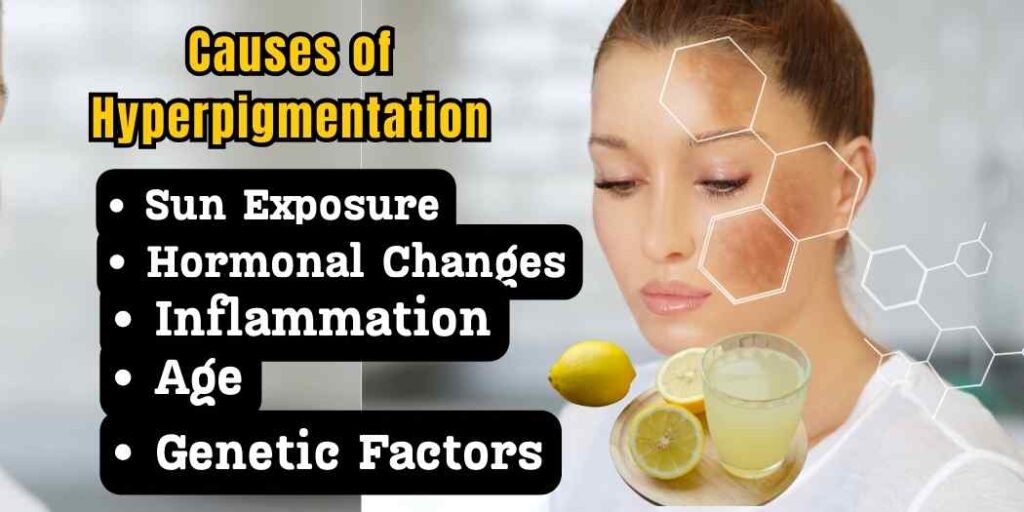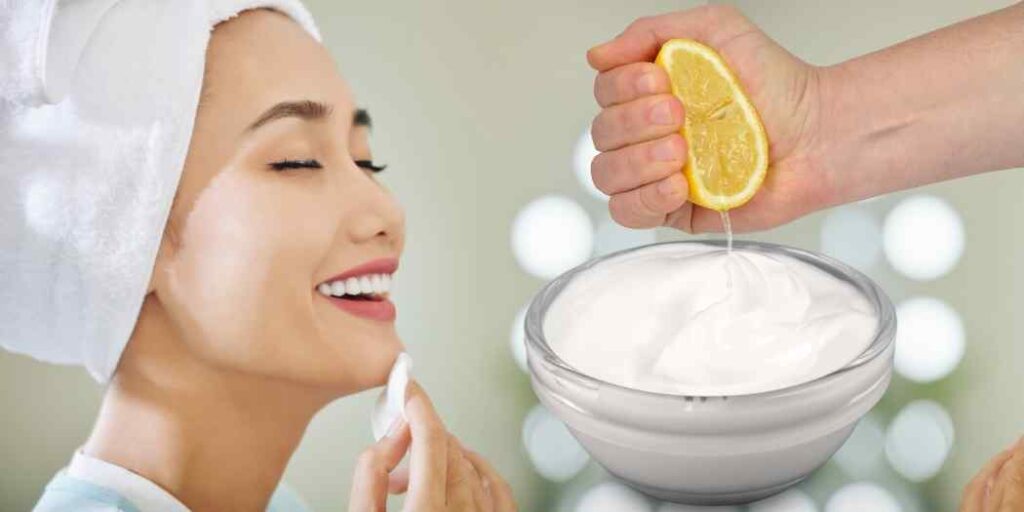Wellhealthorganic.Com How to Easily Remove Dark Spots Lemon Juice:
Dark spots, also known as hyperpigmentation, are a common skincare concern affecting millions worldwide. These spots can appear due to various factors including sun exposure, aging, hormonal changes, and even post-inflammatory issues from conditions like acne.
Dark spots can vary in size and color and are most commonly found in areas frequently exposed to the sun, such as the face, hands, and arms.
For those seeking a natural approach to reduce the appearance of these blemishes, lemon juice emerges as a popular home remedy. Rich in vitamin C and citric acid, lemon juice has been touted for its ability to lighten dark spots and even out skin tone. Its natural bleaching properties make it an appealing choice for those looking to enhance their skin’s clarity without harsh chemicals.
In this guide, we will explore how lemon juice can be used safely and effectively to combat dark spots, diving into both the scientific backing and practical applications of this citrus wonder. Whether you’re a long-time advocate of natural skincare solutions or just beginning to explore your options, understanding how to harness the power of lemon juice could be your next step towards achieving a clearer, more radiant complexion.
Table of Contents
Wellhealthorganic.Com Easily Remove Dark Spots Lemon Juice

Understanding Dark Spots
Dark spots, or hyperpigmentation, occur when certain areas of the skin produce more melanin than usual. Melanin is the pigment responsible for the color of our skin, eyes, and hair. While it primarily serves to protect the skin against ultraviolet (UV) light damage, various factors can disrupt its normal production, leading to uneven skin tone and the formation of dark spots.
Causes of Hyperpigmentation

- Sun Exposure: UV radiation is a major trigger for melanin production. Prolonged or intense sun exposure without adequate protection can cause the skin to produce excess melanin as a defense mechanism, leading to sunspots or age spots.
- Hormonal Changes: Hormonal influences, particularly due to estrogen and progesterone, can increase melanin production. This is often seen in conditions such as melasma, which is commonly experienced during pregnancy or when using hormonal contraception.
- Inflammation: Post-inflammatory hyperpigmentation (PIH) occurs after the skin undergoes an inflammatory response. This can be due to acne, eczema, or other skin injuries. The dark spots resulting from PIH usually appear where the skin was affected by inflammation.
- Age: As we age, our skin can naturally develop age spots or liver spots. These are particularly common in people over the age of 50 and those who have spent a lot of time in the sun.
- Genetic Factors: Some people are more prone to hyperpigmentation due to their genetic makeup, which can dictate how quickly and intensely their skin responds to triggers.
The Role of Melanin in Skin Pigmentation

Melanin is produced by cells in the skin called melanocytes. When exposed to certain triggers, such as UV light or hormonal changes, melanocytes are stimulated to produce more melanin. This process is intended to protect deeper layers of the skin from UV damage. The type and amount of melanin produced, influenced by genetic factors, determine the color of an individual’s skin.
There are two primary types of melanin:
- Eumelanin: Provides brown to black pigment and is predominant in darker skin tones. It offers more protection against UV radiation.
- Pheomelanin: Provides red to yellow pigment and is more common in individuals with lighter skin tones.
Understanding the complex role of melanin in skin pigmentation helps in identifying effective treatments for hyperpigmentation. By targeting the factors that affect melanin production, it’s possible to devise strategies that can reduce or even out excessive pigmentation, thus improving overall skin appearance. In the next sections, we will explore how lemon juice, with its natural lightening properties, can play a part in these strategies.
The Science Behind Lemon Juice for Dark Spots
Lemon juice is not just a kitchen staple but also a celebrated natural remedy in the world of skincare, particularly for addressing hyperpigmentation. Its efficacy against dark spots can be attributed to its rich nutritional content and specific properties that interact with the skin’s natural processes.
Nutritional Content of Lemon Juice and Benefits for the Skin
Lemon juice is highly valued for its high vitamin C content. Vitamin C, or ascorbic acid, is a powerful antioxidant that plays a crucial role in skin health. Here are some of the key components of lemon juice and their benefits:
- Vitamin C: This essential nutrient is pivotal in the production of collagen, a protein that helps keep the skin firm and youthful. Vitamin C also inhibits the enzyme tyrosinase, which is involved in melanin production. By doing so, it helps lighten hyperpigmentation and even out skin tone.
- Citric Acid: An alpha-hydroxy acid (AHA), citric acid helps to exfoliate the top layer of dead skin cells to reveal fresher, brighter skin underneath. This natural exfoliation process can reduce the appearance of dark spots and contribute to a more even complexion.
- Flavonoids: These are potent antioxidants found in lemon juice, which help fight free radicals, reduce inflammation, and support skin repair. This can be particularly beneficial in healing and preventing post-inflammatory hyperpigmentation.
How Lemon Juice Affects Melanin Production and Skin Health
Lemon juice’s impact on skin health and melanin production involves a multifaceted approach:
- Inhibition of Tyrosinase: As mentioned, vitamin C in lemon juice acts as a natural inhibitor of tyrosinase, the enzyme that catalyzes the production of melanin. Regular application of lemon juice can slow down melanin synthesis, leading to a gradual fading of dark spots.
- Exfoliation: The natural acidity of lemon juice provides a gentle peeling effect that helps to remove the outer layer of dead skin cells. This exfoliation not only helps to diminish the appearance of existing dark spots but also promotes a healthier skin turnover.
- Antioxidant Protection: Antioxidants in lemon juice, primarily vitamin C and flavonoids, protect the skin from oxidative stress and can reduce the triggers for excess melanin production caused by environmental factors such as UV rays and pollution.
- Enhanced Skin Barrier: Regular application of components like vitamin C can strengthen the skin’s barrier function, making it more resilient to external stressors and less prone to damage and pigmentation issues.
While the benefits of lemon juice for skin lightening are backed by its composition, it is crucial to use it correctly to avoid adverse effects, such as irritation or increased sensitivity to sunlight. In the subsequent sections, we will guide you through safe and effective methods to incorporate lemon juice into your skincare routine, ensuring you harness its benefits without compromising skin health.
How to Use Lemon Juice Safely

Using lemon juice for skin care, especially for treating dark spots, requires careful application to avoid irritation and achieve the best results. Here is a step-by-step guide on how to use lemon juice safely on your face, along with suggestions for combining it with other natural ingredients to enhance its effectiveness.
Step-by-Step Guide to Using Lemon Juice on the Face
- Perform a Patch Test: Before applying lemon juice to your face, it’s essential to ensure you’re not allergic or overly sensitive to it. Apply a small amount of lemon juice to a discreet area of skin, like the inside of your elbow. Wait for 24 hours to observe any adverse reactions such as redness, itching, or swelling.
- Dilute the Lemon Juice: Pure lemon juice is very acidic and can be harsh on the skin. Dilute it with an equal part of water to reduce its potency and make it safer for skin application.
- Cleanse Your Face: Start with a clean face by washing it with a gentle cleanser to remove impurities and excess oils. This ensures that the lemon juice can be more effectively absorbed into the skin.
- Application: Using a cotton ball or pad, apply the diluted lemon juice to the dark spots or areas of hyperpigmentation. Avoid the eye area where the skin is more delicate.
- Leave it on for a Short Time: Initially, leave the lemon juice on your skin for no more than 5-10 minutes to see how your skin reacts. Over time, if your skin tolerates it well, you can gradually increase the duration up to 20 minutes.
- Rinse Off: Rinse your face thoroughly with lukewarm water after the application. Lemon juice that remains on the skin for too long can cause irritation.
- Moisturize: After rinsing, apply a gentle moisturizer to soothe the skin and prevent dryness.
- Sun Protection: Lemon juice can make your skin more sensitive to sunlight. Apply a broad-spectrum sunscreen with an SPF of at least 30 to protect your skin from UV rays.
Additional Ingredients to Enhance Effectiveness
To boost the efficacy of lemon juice in treating dark spots and to provide additional skin benefits, you can add natural ingredients like honey and turmeric. Here’s how you can incorporate them:
- Lemon Juice and Honey Mask: Honey is known for its antibacterial and soothing properties. Mix the juice of half a lemon with a tablespoon of organic honey. Apply this mixture to your face, focusing on dark spots. Honey also helps to moisturize and soothe the skin, reducing the potential for irritation.
- Lemon Juice and Turmeric Paste: Turmeric contains curcumin, which has powerful anti-inflammatory and antioxidant properties. Mix a tablespoon of turmeric powder with enough lemon juice to form a paste. Apply this to the affected areas to help reduce pigmentation and brighten the complexion.
- Lemon Juice and Yogurt Mask: Yogurt contains lactic acid, another natural exfoliant. Mix the juice of half a lemon with a tablespoon of plain yogurt. This combination helps to gently peel away the top layer of skin, reducing the appearance of dark spots and giving the skin a fresher look.
By following these guidelines, you can safely use lemon juice to help reduce dark spots while taking care of your overall skin health. Remember, consistency is key, and results will vary based on skin type and the underlying cause of the hyperpigmentation.
DIY Lemon Juice Remedies
Lemon juice can be incorporated into various DIY remedies to help lighten dark spots. Below are recipes and instructions for creating effective topical treatments at home using lemon juice combined with other natural ingredients.
1. Lemon and Honey Mask

Ingredients:
- Juice from half a lemon
- 1 tablespoon of organic honey
Instructions:
- Mix Ingredients: In a small bowl, combine the freshly squeezed lemon juice with organic honey until you achieve a smooth mixture.
- Apply: Use a clean brush or your fingertips to apply the mask evenly across your face, avoiding the eye area.
- Leave on: Allow the mask to sit on your skin for about 15-20 minutes. The lemon juice acts as a lightening agent while the honey soothes and moisturizes the skin.
- Rinse Off: Wash the mask off with lukewarm water and pat your face dry with a soft towel.
- Moisturize: Follow up with a gentle moisturizer to hydrate your skin.
This mask is ideal for use 1-2 times a week to help reduce dark spots and enhance skin brightness.
2. Lemon Juice and Turmeric Paste

Ingredients:
- 1 tablespoon of turmeric powder
- Juice from half a lemon
Instructions:
- Prepare the Paste: Mix the turmeric powder with lemon juice in a bowl until a paste is formed. If the mixture is too dry, add more lemon juice sparingly.
- Apply: Spread the paste evenly over the areas with dark spots or as a full face mask, avoiding the eye area.
- Set Time: Let the paste sit on your skin for about 15-20 minutes. Turmeric has anti-inflammatory properties, and lemon juice serves as a bleach.
- Rinse Off: Carefully rinse off the paste with lukewarm water. Turmeric may stain, so ensure all residue is removed.
- Moisturize: Apply a moisturizer to soothe the skin after treatment.
Use this treatment once a week to help fade dark spots and even out skin tone.
3. Overnight Lemon Juice Treatment
Ingredients:
- Freshly squeezed lemon juice
Instructions:
- Preparation: Pour a small amount of lemon juice onto a cotton ball.
- Apply: Dab the cotton ball directly onto the dark spots, ensuring that the lemon juice does not spread to sensitive areas.
- Leave Overnight: Allow the lemon juice to dry and leave it on your skin overnight.
- Rinse in the Morning: In the morning, rinse your face thoroughly with cool water.
- Sun Protection: Apply a high SPF sunscreen as lemon juice can make your skin photosensitive.
This treatment should be used sparingly, no more than once a week, due to its potentially strong effects on the skin.
4. Lemon and Yogurt Soothing Blend

Ingredients:
- Juice from half a lemon
- 1 tablespoon of plain yogurt
Instructions:
- Mix: Combine the lemon juice with plain yogurt until you achieve a consistent blend.
- Apply: Spread the mixture evenly across your face, avoiding the sensitive eye area.
- Relax: Leave the mask on for about 20 minutes. The lactic acid from the yogurt complements the lemon juice by gently exfoliating and moisturizing the skin.
- Rinse Off: Rinse the mask off with lukewarm water and finish with a splash of cool water to tighten pores.
- Moisturize: Moisturize your skin to restore hydration.
This soothing blend can be used 1-2 times a week to help nurture and brighten the skin while reducing the visibility of dark spots.
These DIY remedies utilize the natural properties of lemon juice to improve skin clarity and reduce hyperpigmentation, making them a valuable addition to your skincare regimen. Always remember to follow each treatment with adequate sun protection to prevent further darkening of spots.
Safety and Precautions
While lemon juice is a popular natural remedy for lightening dark spots, it’s crucial to use it correctly to avoid potential skin irritation and other adverse effects. Here are detailed precautions to ensure safe usage:
Precautions to Avoid Skin Irritation
- Always Dilute Lemon Juice: Lemon juice is highly acidic, which can be too harsh for direct application on the skin. Always dilute it with water or blend it with other soothing ingredients like honey or yogurt to mitigate its acidic nature.
- Conduct a Patch Test: Before using lemon juice on your face, especially if you have sensitive skin, perform a patch test. Apply a small amount of the diluted lemon juice to an inconspicuous part of your skin, such as the inside of your wrist or elbow. Wait 24-48 hours to check for any adverse reactions like redness, burning, or itching.
- Use in Moderation: Lemon juice should not be used too frequently as it can strip the skin of its natural oils, leading to dryness or overproduction of sebum. Limit application to 1-2 times per week.
- Monitor Skin’s Response: Pay attention to how your skin reacts during and after application. If you experience discomfort, redness, or irritation, rinse off immediately and discontinue use.
- Avoid Sensitive Areas: Keep lemon juice away from the eyes and other sensitive areas. If accidental contact occurs, rinse thoroughly with water.
- Post-Application Care: After rinsing off lemon juice treatments, always apply a moisturizer to hydrate and soothe the skin. This helps restore any moisture that may have been lost due to the acidity of the lemon.
Advice on Sun Exposure After Applying Lemon Juice
- Increased Photosensitivity: Lemon juice can increase your skin’s sensitivity to the sun, known as photosensitivity, which can lead to quicker sunburns or intensified dark spots.
- Use Sunscreen: It is imperative to apply a broad-spectrum sunscreen with an SPF of 30 or higher after using lemon juice on your skin. Reapply sunscreen every two hours if you are staying outdoors for extended periods.
- Limit Sun Exposure: Try to limit direct sun exposure, especially during peak hours from 10 a.m. to 4 p.m., when UV rays are strongest. Wearing protective clothing, such as hats and long sleeves, can also help protect your skin.
- Wait Before Going Outdoors: After applying lemon juice treatments, wait for at least a few hours before exposing your skin to sunlight. This can help reduce the risk of photosensitivity.
- Watch for Signs of Sun Damage: Be vigilant about any new signs of skin damage or changes in existing spots. If you notice any worsening of dark spots or other signs of skin damage, reconsider your use of lemon juice and consult a dermatologist.
By following these safety guidelines and precautions, you can effectively use lemon juice as part of your skincare routine while minimizing the risk of irritation and protecting your skin from the adverse effects of sun exposure.
Alternative Remedies and Lifestyle Tips

In addition to using lemon juice, there are other effective natural remedies and important lifestyle changes that can help prevent and reduce the appearance of dark spots. Incorporating these methods can enhance your skin health and contribute to a more even skin tone over time.
Alternative Natural Remedies for Dark Spots
- Aloe Vera: Known for its soothing and healing properties, aloe vera is also effective in treating hyperpigmentation. It contains aloin, a natural depigmenting compound that can lighten dark spots. Apply fresh aloe vera gel directly from the plant to the affected areas before bedtime, and leave it on overnight for best results.
- Green Tea Extract: Rich in antioxidants, green tea can help reduce skin damage and prevent the formation of dark spots due to its anti-inflammatory properties. You can use cooled green tea bags as a compress on dark spots or rinse your face with brewed green tea for a gentle, skin-protecting tonic.
- Vitamin E: This powerful antioxidant helps repair and protect the skin from damage caused by free radicals and UV exposure. Applying vitamin E oil directly to dark spots can help fade their appearance due to its moisturizing and healing benefits.
- Licorice Extract: Licorice root contains glabridin, a compound that inhibits the production of tyrosinase, thereby reducing melanin production. Apply a serum or cream containing licorice extract to the affected areas to help lighten dark spots.
Lifestyle Changes to Prevent Dark Spots
- Sun Protection: One of the most critical steps in preventing dark spots is to protect your skin from the sun. Always apply a broad-spectrum sunscreen with an SPF of 30 or higher every day, even on cloudy days and in winter. Reapply every two hours when in direct sunlight or after swimming or sweating.
- Wear Protective Clothing: Along with sunscreen, wear wide-brimmed hats, long-sleeved shirts, and pants to cover exposed skin when outdoors for prolonged periods. This can significantly reduce your exposure to harmful UV rays.
- Healthy Diet: Eating a diet rich in antioxidants can help protect your skin from the inside out. Include plenty of fruits and vegetables in your meals, particularly those rich in vitamin C, vitamin E, and other antioxidants. Foods like oranges, strawberries, almonds, and spinach are great choices.
- Avoid Smoking: Smoking can exacerbate skin pigmentation issues by increasing oxidative stress in the body. Quitting smoking can improve your overall skin health and help prevent the formation of new dark spots.
- Manage Stress: Chronic stress can affect your skin’s ability to heal and maintain a healthy pigment balance. Engage in stress-reducing activities such as yoga, meditation, or regular exercise to improve not only your skin health but also your overall wellbeing.
By combining these alternative remedies with responsible lifestyle choices, you can more effectively manage and prevent dark spots, enhancing both the health and appearance of your skin.
FAQs: Using Lemon Juice for Dark Spots
Here are answers to some common questions about using lemon juice as a remedy for dark spots. These insights can help you use lemon juice effectively and safely in your skincare routine.
1. Can lemon juice really help remove dark spots on my face?
Yes, lemon juice can help lighten dark spots on the face due to its high vitamin C content and natural acidity. Vitamin C is an antioxidant that inhibits melanin production, while the citric acid in lemon juice provides a mild bleaching effect. However, results can vary based on your skin type and the underlying causes of the hyperpigmentation.
2. How often should I apply lemon juice to my face for dark spots?
It is generally safe to apply diluted lemon juice to your face 1-2 times per week. Overusing lemon juice can lead to skin irritation or dryness due to its acidic nature. Always monitor your skin’s reaction and adjust frequency accordingly.
3. What is the best way to use lemon juice for removing dark spots?
The best way to use lemon juice for dark spots is to apply it in a diluted form to prevent irritation. You can mix it with ingredients like honey, yogurt, or water to create a soothing, effective treatment. Apply the mixture directly to the spots using a cotton ball, leave it on for about 10-20 minutes, then rinse off with lukewarm water.
4. Are there any side effects of using lemon juice on my face?
While lemon juice is safe for most people when used properly, it can cause side effects such as redness, dryness, and skin irritation, especially in those with sensitive skin. Lemon juice can also make your skin more sensitive to sunlight, increasing the risk of sunburn. Always perform a patch test before using it on your face and use sunscreen to protect your skin from UV rays.
5. How long does it take to see results from using lemon juice on dark spots?
The time it takes to see results from using lemon juice can vary. Some people may notice improvements within a few weeks, while others may take longer to see significant changes. Consistency is key, and it is important to maintain a regular skin care routine and protect your skin from sun exposure to achieve the best results.
6. Can I leave lemon juice on my face overnight?
It is not recommended to leave lemon juice on your face overnight due to its high acidity, which can cause severe dryness and irritation. Instead, limit the application to 10-20 minutes and always rinse your face thoroughly afterward.
7. What should I do if I experience irritation from lemon juice?
If you experience irritation after applying lemon juice, rinse your skin immediately with cool water and apply a gentle moisturizer. Avoid using lemon juice in the future, or try diluting it further and reducing the application time. If irritation persists, consult a dermatologist.
8. Wellhealthorganic Easily Remove Dark Spots Lemon Juice Review – Does It Really Work?
Lemon juice can be effective in lightening dark spots due to its vitamin C and citric acid content, which help inhibit melanin production and offer mild exfoliating effects. However, results vary based on individual skin type, the cause of the dark spots, and consistent use. It is not a quick fix but can significantly improve appearance over time with regular application.
9. How to Remove Dark Spots in 5 Minutes?
It is unrealistic to expect any treatment to remove dark spots in just 5 minutes. Skin treatments, especially natural remedies like lemon juice, require consistent application over weeks or months to see visible results. For immediate concealment, makeup such as concealers and foundations are more suitable.
10. How to Remove Dark Spots on Face Fast Naturally?
Natural remedies like lemon juice, aloe vera, and turmeric can help lighten dark spots over time, but “fast” results in natural skincare are relative. Consistency and patience are key. Incorporating these remedies into your regular skincare routine can yield improvements within a few weeks to months.
11. How to Remove Dark Spots on Body Fast?
The same natural ingredients used for facial dark spots can be applied to the body. To accelerate results, ensure the affected areas are regularly exfoliated and moisturized, and consistently apply natural lightening agents like lemon juice or aloe vera. Protecting the skin from further sun damage with sunscreen is also crucial.
12. How to Remove Dark Spots Caused by Pimples?
Post-inflammatory hyperpigmentation (PIH) from pimples can be treated with lemon juice due to its lightening properties. Other effective ingredients include niacinamide and vitamin C. Ensure to treat acne properly to prevent new spots from forming and use targeted spot treatments to lighten PIH.
13. How to Remove Dark Spots on Face Overnight?
While overnight results are not feasible for genuinely reducing dark spots, using targeted treatments like lemon juice mixed with honey or turmeric as an overnight mask can start the process of skin lightening. Results will become more visible with regular use over several weeks.
14. How to Remove Dark Spots on Face in 3 Days?
Significant lightening of dark spots in three days is highly unlikely with natural remedies. For faster results, clinical treatments such as chemical peels, laser therapy, or topical medications like hydroquinone or retinoids may be considered, under professional guidance.
Some concise answers to your FAQs regarding the use of lemon and other remedies for skin care:
- Can I apply lemon directly on my face?
No, dilute it to prevent irritation. - Which juice removes dark spots?
Lemon juice. - How long does it take for lemon juice to fade age spots?
Several weeks with consistent use. - How to remove dark spots on the body fast?
Regular exfoliation and lemon juice application; use sunscreen. - Can lemon remove dark spots?
Yes, over time. - How to remove dark spots in 5 minutes?
Not possible; use makeup for immediate cover. - Is it OK to rub lemon on skin?
Only if diluted; avoid sensitive areas. - Can I rub lemon on my face every day?
Not recommended; can dry out skin. - Does lemon remove tan?
Yes, it can lighten tanned skin. - How can I remove dark spots in 2 days at home?
Not realistically possible; requires more time. - How to get clear skin?
Maintain a consistent skincare routine and healthy diet. - How to remove black dots on skin?
Gentle exfoliation and targeted treatments like salicylic acid. - What can I mix with lemon to remove dark spots?
Honey or turmeric for added benefits. - How to remove a dark spot naturally?
Use lemon juice, aloe vera, or licorice extract regularly. - How to remove spots from the face in 2 days naturally with lemon?
Immediate results are unlikely; longer treatment is needed. - Do turmeric and lemon remove dark spots?
Yes, they can help lighten spots over time. - How to whiten skin with lemon in 7 days?
Noticeable skin lightening in 7 days is unrealistic; gradual results. - Can lemon and sugar remove dark spots?
They can help through exfoliation, but use with caution. - Can I apply lemon on hair?
Yes, it can lighten hair but may dry it out. - Is lemon good for OILY skin?
Yes, it can help reduce oiliness but should be used diluted. - Can I apply lemon on pimples?
Not advisable; can irritate skin. - Can lemon remove scars?
It may help lighten them but won’t fully remove scars. - What can I mix with lemon for my face?
Mix with aloe vera, honey, or yogurt for soothing effects. - Can I leave lemon on my face overnight?
No, it can cause severe irritation. - Can black spots go away?
Yes, with treatment and time. - Can dark spots be removed?
Yes, through consistent skincare and treatments. - How to remove spots from face in 2 days naturally?
Immediate results are not possible; consistent treatment is necessary.
Conclusion and Key Takeaway
Lemon juice is a versatile and natural remedy that has been used for centuries to address a variety of skin concerns, including dark spots. Rich in vitamin C and citric acid, it offers benefits such as brightening the skin, promoting an even skin tone, and providing antioxidant protection. However, while lemon juice can be effective, it’s important to approach its use with care to avoid potential side effects.
Recap of Benefits and Precautions
Benefits:
- Skin Lightening: Lemon juice can lighten dark spots and hyperpigmentation due to its citric acid and vitamin C content.
- Exfoliation: The natural acidity helps to gently peel away the outer layer of dead skin cells, revealing fresher and brighter skin beneath.
- Antioxidant Properties: Vitamin C in lemon juice provides antioxidant protection against environmental stressors, supporting overall skin health.
Precautions:
- Skin Sensitivity: Lemon juice can make the skin more sensitive to sunlight, increasing the risk of sunburn.
- Irritation Potential: Its high acidity can cause irritation, especially on sensitive or damaged skin. It should always be used in a diluted form and not applied too frequently.
- Patch Testing: Always perform a patch test before incorporating lemon juice into your skincare routine to ensure you don’t have an adverse reaction.
Encouragement to Try These Remedies Responsibly
For those looking to incorporate lemon juice into their skincare regimen, it’s crucial to do so responsibly. Start with small, diluted amounts, observe how your skin reacts, and gradually build up if no adverse effects occur. Always follow up with a moisturizer and SPF to protect your skin from potential dryness and UV damage.
Exploring natural remedies like lemon juice can be a rewarding part of your skincare journey, offering a sense of empowerment and connection to nature. However, patience and persistence are key—natural remedies typically show results over time rather than immediately. If you’re dealing with severe hyperpigmentation or if lemon juice doesn’t seem to work for you, consulting a dermatologist is advisable.
By taking these steps, you can safely and effectively use lemon juice to enhance your skin’s appearance, tapping into its natural benefits while minimizing risks.
Note: Please note that the information provided in this blog post is for informational purposes only. Always consult with a healthcare professional before trying new skincare treatments.
Read More WellHealth Tips:
लंबे समय तक बैठने से स्वास्थ्य को कैसे खतरा हो सकता है?
क्या आप अपने फिटनेस लक्ष्यों को जीतना चाहते हैं? जानिए मांसपेशियाँ कैसे बनाएं!”
Wellhealth Ayurvedic Health Tips:स्वस्थ रहें आयुर्वेद के साथ

